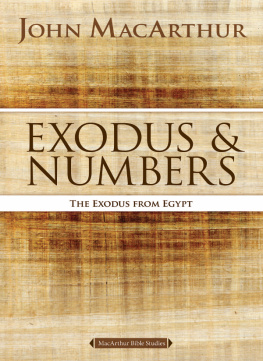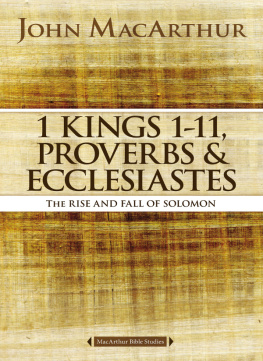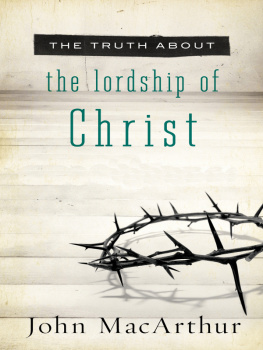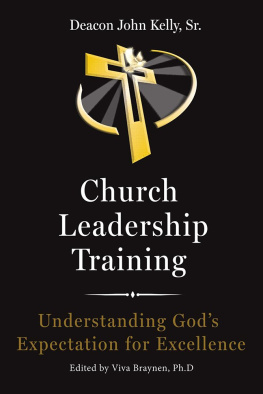
M OODY P UBLISHERS
CHICAGO
2008 by
J OHN M AC A RTHUR
1991 by
T HE M OODY B IBLE I NSTITUTE
OF C HICAGO
All rights reserved. No part of this book may be reproduced in any form without permission in writing from the publisher, except in the case of brief quotations embodied in critical articles or reviews.
All Scripture quotations, unless otherwise indicated, are taken from the New American Standard Bible, Copyright 1960, 1962, 1963, 1968, 1971, 1972, 1973, 1975, 1977, 1995 by The Lockman Foundation. Used by permission. (www.Lockman.org)
Scripture quotations marked NIV are taken from the Holy Bible, New International Version. NIV. Copyright 1973, 1978, 1984 by International Bible Society. Used by permission of Zondervan. All rights reserved.
Scripture quotations marked KJV are taken from the King James Version.
Scripture quotations marked NKJV are taken from the New King James Version. Copyright 1982 by Thomas Nelson, Inc. Used by permission. All rights reserved.
Editor: Jim Vincent
Interior Design: Ragont Design
Cover Design: Smartt Guys design
Cover Image: Larry Dyke
Library of Congress Cataloging-in-Publication Data
MacArthur, John, 1939
The masters plan for the church / John MacArthur.[Rev. ed.].
p. cm.
Includes bibliographical references and indexes.
ISBN-13: 978-0-8024-7845-0
ISBN-10: 0-8024-7845-X
1. Christian life. 2. Pastoral theology. I. Title.
BV4501.3.M2122 2008
262dc22
2007043264
We hope you enjoy this book from Moody Publishers. Our goal is to provide high-quality, thought-provoking books and products that connect truth to your real needs and challenges. For more information on other books and products written and produced from a biblical perspective, go to www.moodypublishers.com or write to:
Moody Publishers
820 N. LaSalle Boulevard
Chicago, IL 60610
1 3 5 7 9 10 8 6 4 2
Printed in the United States of America
CONTENTS
INTRODUCTION
SHEPHERDS AND CONSTRUCTION WORKERS
Be on guard for yourselves and for all the flock, among which the Holy Spirit has made you overseers, to shepherd the church of God which He purchased with His own blood.
Acts 20:28
For we are Gods fellow workers; you are Gods building. According to the grace of God which was given to me, like a wise master builder I laid a foundation, and another is building on it. But each man must be careful how he builds on it. For no man can lay a foundation other than the one which is laid, which is Jesus Christ.
1 Corinthians 3:9-11
S ome contemporary church leaders fancy themselves businessmen, media figures, entertainers, psychologists, philosophers, or lawyers. Yet those notions contrast sharply with the metaphors Scripture employs to depict spiritual leaders.
In 2 Timothy 2, for example, Paul uses seven different metaphors to describe the rigors of leadership. He pictures the minister as a teacher (v. 2), a soldier (v. 3), an athlete (v. 5), a farmer (v. 6), a workman (v. 15), a vessel (vv. 2021), and a slave (v. 24). All those images evoke ideas of sacrifice, labor, service, and hardship. They speak eloquently of the complex and varied responsibilities of spiritual leadership. Not one of them makes leadership out to be glamorous.
Thats because it is not supposed to be glamorous. Leadership in the churchand Im speaking of every facet of spiritual leadership, not just the pastors roleis not a mantle of status to be conferred on the churchs aristocracy. It isnt earned by seniority, purchased with money, or inherited through family ties. It doesnt necessarily fall to those who are successful in business or finance. It isnt doled out on the basis of intelligence or talent. Its requirements are faultless character, spiritual maturity, and a willingness to serve humbly.
Our Lords favorite metaphor for spiritual leadership, a figure He often used to describe Himself, is that of a shepherdone who tends Gods flock. Every church leader is a shepherd. Even the word pastor itself means shepherd. It is appropriate imagery. A shepherd leads, feeds, nurtures, comforts, corrects, and protects. Those are responsibilities of every churchman.
Shepherds are without status. In most cultures, shepherds occupy the lower rungs of societys ladder. That is fitting, too, for our Lord said, The one who is the greatest among you must become like the youngest, and the leader like the servant (Luke 22:26).
Under the plan God has ordained for the church, leadership is a position of humble, loving service. Church leadership is ministry, not management. Those whom God designates leaders are called not to be governing monarchs but humble slaves; not slick celebrities but laboring servants. The man who leads Gods flock must above all exemplify sacrifice, devotion, submission, and lowliness.
Jesus Himself gave us the leadership pattern when He stooped to wash His disciples feet (John 13:317), a task the lowest of slaves customarily did. If the Lord of the universe would wash feet, no church leader has a right to think of himself as a bigwig.
One great difference exists between herding sheep and leading a church. Shepherding animals is only semiskilled labor. There are no colleges that offer graduate degrees in shepherding. It isnt that difficult a job. Even a dog can be trained to guard a flock of sheep. In biblical times, young boysDavid, for example (1 Sam. 16:11)herded sheep while the older men did tasks that required more skill and maturity.
Shepherding a spiritual flock is not so simple. It takes more than a wandering bumpkin to be a spiritual shepherd. The standards are high; the requirements hard to satisfy. Not everyone can meet the qualifications, and of those who do, few seem to excel at the task. Spiritual shepherdology demands a godly, gifted, multiskilled man of integrity. Remember, he must also be able to fill the roles of teacher, soldier, athlete, farmer, and slave. Yet he must maintain the perspective and demeanor of a boy shepherd.
Thats not all. Church leaders are spiritual construction workers. In 1 Corinthians 3, Paul likens ministers to master builders who follow a set of biblical blueprints, laboring in partnership with God to construct a buildingthe church:
For we are Gods fellow workers; you are Gods building. According to the grace of God which was given to me, like a wise master builder I laid a foundation, and another is building on it. But each man must be careful how he builds on it. For no man can lay a foundation other than the one which is laid, which is Jesus Christ (1 Cor. 3:911).
Wise builders follow the blueprints precisely; the slightest deviation from an architects plans in the early stages can result in a tottering monstrosity by the time construction reaches the upper floors. Gods Word is the blueprint for spiritual construction, and only those who follow it exactly are building anything that will stand firm.
As builders, then, we must build by the right plan. And as shepherds, we must lead in the right paths. Either way, we determine the direction of our people. Hosea 4:9 says, Like people, like priest. In other words, people emulate the example of their spiritual leaders.
Perhaps that explains the pathetic state of the contemporary church. Many of the best-known and most visible religious leaders utterly fail to measure up to any biblical standard. Every leader who follows their pattern is destined to fail. They are building with the wrong set of plans, and if I may combine the two metaphors, they are misleading their sheep.


















